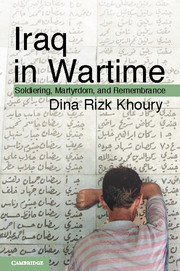Book contents
- Frontmatter
- Contents
- List of Illustrations, Maps, and Table
- Acknowledgments
- Note on Translations and Transliteration
- Maps
- 1 Introduction
- 2 Iraq’s Wars under the Ba‘th
- 3 The Internal Front
- 4 Battlefronts
- 5 Things Fall Apart
- 6 War’s Citizens, War’s Families
- 7 Memory for the Future
- 8 Commemorating the Dead
- 9 Postscript
- Appendix I Distribution in Percentage of Ba‘th Party Members, “Friends of Saddam,” and Martyrs in Fifteen Iraqi Provinces, 1998–1999
- Appendix II Percentage of Ba‘th Party Membership among Matriculating Students (Sixth Secondary) in Ten Iraqi Provinces, 1987–1988
- Appendix III Report Issued by Ali Hasan al-Majid, Head of the Northern Bureau of the Ba‘th Party to the General Secretariat, August 1987
- Sources and Bibliography
- Index
- References
1 - Introduction
Published online by Cambridge University Press: 05 March 2013
- Frontmatter
- Contents
- List of Illustrations, Maps, and Table
- Acknowledgments
- Note on Translations and Transliteration
- Maps
- 1 Introduction
- 2 Iraq’s Wars under the Ba‘th
- 3 The Internal Front
- 4 Battlefronts
- 5 Things Fall Apart
- 6 War’s Citizens, War’s Families
- 7 Memory for the Future
- 8 Commemorating the Dead
- 9 Postscript
- Appendix I Distribution in Percentage of Ba‘th Party Members, “Friends of Saddam,” and Martyrs in Fifteen Iraqi Provinces, 1998–1999
- Appendix II Percentage of Ba‘th Party Membership among Matriculating Students (Sixth Secondary) in Ten Iraqi Provinces, 1987–1988
- Appendix III Report Issued by Ali Hasan al-Majid, Head of the Northern Bureau of the Ba‘th Party to the General Secretariat, August 1987
- Sources and Bibliography
- Index
- References
Summary
When U.S.-led forces invaded Iraq in 2003, they occupied a country that had been at war for twenty-three years. September 22, 1980 marked the beginning of an eight-year war with Iran that cost both countries more than a million lives and transformed their social and political landscapes. War’s end brought no relief to Iraqis. On August 2, 1990, Saddam Hussain made the disastrous decision to invade Kuwait. In January 1991, a coalition of twenty-eight countries, led by the United States and Britain, initiated a devastating bombing campaign that lasted for forty-two days, destroyed a large part of the Iraqi infrastructure, and caused tens of thousands of deaths. In the immediate aftermath of the First Gulf War, a massive uprising nearly toppled the regime, which in turn unleashed its violence against its own population. Despite the end of hostilities, the imposition by the UN of the most comprehensive embargo ever enforced on a nation, accompanied by periodic bombing by the United States and Britain, was effectively a continuation of war. By the end of the Ba‘thist regime in 2003, war had become the norm rather than the exception. The result of this normalization of war has been the militarization of Iraqi politics and society, the brutalization of public culture, and the creation of irreconcilable divisions within Iraq. Yet in the domestic buildup to the U.S.-led invasion, less than a handful of American policy makers, academics, or commentators devoted much analysis to the centrality of the imperatives of war making in shaping the nature of Iraqi state power, the manner by which the Iraqi regime governed its population, or war’s impact on Iraqis’ understanding of citizenship and belonging. This book is an attempt to bring war front and center to the study of Iraq. It focuses on the political, social, and cultural processes and consequences of the normalization of war over more than a generation.
- Type
- Chapter
- Information
- Iraq in WartimeSoldiering, Martyrdom, and Remembrance, pp. 1 - 19Publisher: Cambridge University PressPrint publication year: 2013



